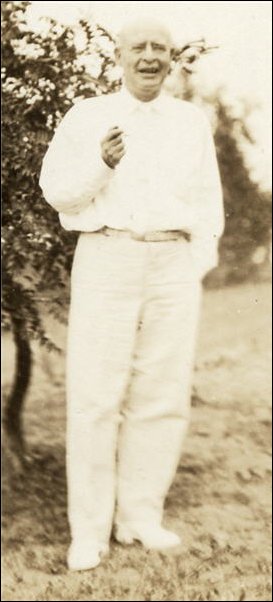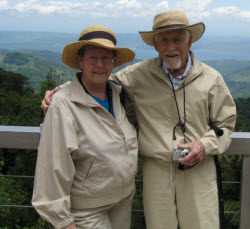Dad West - Thomas West
 The house was plain but very comfortable.. It was squarish, white clapboard, and had a red roof so it was easily spotted from Salem several miles away. It had four bedrooms upstairs and one bath. Downstairs there was a comfortable hall leading directly back to a good-sized kitchen. To the right as you entered was the living room with an over-sized fireplace, and the dining room was behind that. There was a large screened-in porch with a hammock on the front, and behind the kitchen was a rough unfinished and unheated room used for storage of wood and other necessities. The house was heated by a space heater in the hall, the fireplace, and a coal-burning cookstove in the kitchen. There was no electricity, but bright incandescent lighting was supplied by kerosene lamps with mantles that glowed. In the living room there was a cluster of them to form a chandelier that could be adjusted for height. There was no telephone. Water was supplied from a well.
The house was plain but very comfortable.. It was squarish, white clapboard, and had a red roof so it was easily spotted from Salem several miles away. It had four bedrooms upstairs and one bath. Downstairs there was a comfortable hall leading directly back to a good-sized kitchen. To the right as you entered was the living room with an over-sized fireplace, and the dining room was behind that. There was a large screened-in porch with a hammock on the front, and behind the kitchen was a rough unfinished and unheated room used for storage of wood and other necessities. The house was heated by a space heater in the hall, the fireplace, and a coal-burning cookstove in the kitchen. There was no electricity, but bright incandescent lighting was supplied by kerosene lamps with mantles that glowed. In the living room there was a cluster of them to form a chandelier that could be adjusted for height. There was no telephone. Water was supplied from a well.
I don’t know whether they invited me to spend some time with them, or I invited myself. But beginning when I was 13 years old and continuing until I was 16, I would spend a couple of weeks with them right after school was out in late May. I also would occasionally spend a weekend with them during the school year. They seemed to enjoy my intrusion on their solitary lives.
I remember my first visit. There was a bunk on the screened front porch and that is where I chose to sleep. I think Dad West wished to install a little military-type discipline in me because he would awaken me for breakfast, and when at first I lingered in bed he gently chastised me. I quickly learned to get up promptly. A sharp memory for me is lying in bed and listening to a mourning dove that had built its simple flat nest in an apple tree just across the road from the house. It was the first dove I had ever heard.
I made special efforts to make myself welcome, so I did chores I was not used to doing at home. My Aunt Vedy could not believe it when she learned I made my bed. I brought in wood from the back porch and coal from the coal shed. I learned to get chicken feed from the big steel barrels in the feed and fuel shed, and to feed the chickens and gather eggs. I got kerosene from there also and filled the lamps. In time I learned to start the gasoline pump in the well-house. I picked strawberries for the table from their ample strawberry patch, and lettuce that grew along one protected side of the house. It was a great place to be.
Jule was a suburb cook. The delicious food was a major attraction of the place. For lunch we would have Dagwood-type sandwiches, with fresh-picked lettuce, tomato slices, chicken or ham, and slices of hard-boiled egg. They had a jersey cow, and the cream would rise to the top of the pail of milk about an inch or more thick and would be very heavy. No doubt the cholesterol content of Jule’s cooking was very high and undoubtedly contributed to Dad’s heart trouble..
There was one special treat for me. Jule made scrumptious gingerbread, and while it was still warm I would take a slice and pour rich cream over it. I savor it as I write this, just thinking about it.
One other thing sticks to my memory from that first two-week visit. Like most 13-year-old kids, I was not great on vegetables. At dinner one night Jule had fixed squash.
"I don’t like squash," I said. "You don’t have to eat it, but just try it." I was their guest; to be polite I should try it. I did, and it was delicious. It was the beginning of the breakdown for me of my distaste for all vegetables. .
They had two dogs, a fox terrier and a collie-type that was probably a cross. The dogs loved to go with me as I tramped through the orchard or the surrounding hills. I did a lot of that. A favorite jaunt was along a little wagon road that petered out some way from the orchard into a path through the woods. It ended at a mountain stream, which was usually my destination. I played many imaginative games there by myself, climbed trees, and one day stepped on a snake. I think it was a water snake and as frightened as I was, for it scurried to the creek. There was a dirt road on the other side of the creek and sometimes I followed it up to a gap in the mountains.
Being by myself a lot as a child, I learned to play by myself and used my imagination to think up games. One game was based on baseball. I would take a stick of apple wood which I used as a bat to hit a three or four inch piece of apple wood, the "ball". With a quick flip of my left wrist I would release the twirling short piece with my left hand and strike at it with the stick in my right hand. If I missed it was a strike out. If I hit into one of the big apple trees just beyond the clearing in which I was standing it was a caught fly. There were different areas for singles, doubles, etc. If I hit it clear over the trees it was a home run.
As I got older, of course, my interests and the games changed. By the time I was 15 I had become interested in girls. That year my Uncle Leslie was going with a young Catholic woman in Roanoke and I became interested in her younger sister, Hazel, who was 17. One time Dad let me borrow his big handsome Chrysler to drive all the way into Roanoke for a date with her. This was in the fall when I was picking apples professionally while living at Dad’s. I have written elsewhere about this work experience (schools were late opening because of a polio outbreak).
The summer I was 17 Jule asked that I come stay awhile with them. Dad was dying of heart trouble. One thing I did to amuse myself while I was there was to prove the law of averages, at least to my satisfaction. I would shuffle a regular deck of playing cards and lay out ten cards in four piles according to their suit. I would count the number of cards in each pile, record it, and repeat the same procedure. It wasn’t long before the total number of cards I had recorded in each stack was very close to 25 percent of the total number played.
One little adventure during this stay I remember very well. It was a warm summer night and the moon was full. About 11 p.m. I decided to hike to the top of Twelve O’clock Knob, one of my favorite mountains. It was just over the other side of the mini-mountain on which the orchard lay. I trudged over this little mountain, the two dogs in tow, until I reached the road up Twelve O’clock Knob, about three miles from the top. I knew I would be thirsty, so before leaving Dad’s I stuck a ginger ale bottle in my hip pocket and took along an opener and a cork. Half way up the mountain I drank half the ginger ale and corked the bottle for a drink later, returning the bottle to my hip pocket. At the top of the ountain I was enthralled with the beauty of the night, and as I stood there silently taking it all in, I could hear a screech owl in the distance.
Then a loud "pop" broke my revelry and momentarily startled me, but I quickly realized that the cork had popped out of the bottle. But the two dogs were beating it back down the road. I called to them and the collie came, but the fox terrier apparently didn’t stop until he got back home.
I took a path of about a quarter of a mile or more through some woods to a rocky overlook that afforded a broad view of the valley and another range of mountains beyond. My undershirt was soaked with perspiration, so I built a fire and tried to dry it, with only minimal success, while I kept warm by the fire. When I got back to Dad’s it was broad daylight.
Dad was generally optimistic about his recovery, though he would often have to be propped up in bed to relieve the pain in his chest. He talked about plans he had for the future. Some time around 4 a.m. one morning I was awakened and told that Dad had died. I think the doctor was there. I was asked to drive Dad’s car into Salem to the Oakey funeral home and inform them. Dawn was breaking as I went to the car. There was a beautiful pink color in the east. It was my first experience with death. It seemed very strange.
Tom Lowden West born August 21, 1865 in Leeds, Yorkshire, England and died on July 28, 1931 in Salem, Virginia. He married Kathleen Lewis Koiner (born Nov 1876 ) on 5 Jun 1901 in Richmond, Virginia. By the time of the 1930 census, Kathleen has died.
In the 1930 Census, Thomas L. West is listed as a widower. Living with him was his housekeeper, Jules Haffen.
Name: Tom L West
Birth Year: abt 1866
Gender: Male
Race: White
Birthplace: England
Marital Status:
Widowed
Relation to Head of House: Head
Home in 1930:
Salem, Roanoke, Virginia
Street address: Twelve O'clock Knob
Road
Dwelling Number: 219
Family Number: 221
Home
Owned or Rented: Owned
Home Value: 25000
Radio Set: Yes
Lives on Farm: Yes
Attended School: No
Able to Read
and Write: Yes
Father's Birthplace: England
Mother's
Birthplace: Scotland
Language Spoken: English
Naturalization: Un
Able to Speak English: Yes
Occupation: Orchardist
Industry: Apple Growing
Class of
Worker: Working on own account Employment: Yes
